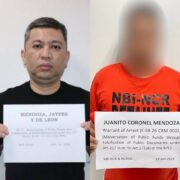Becoming messengers of God
Nov. 26—34th Sunday in Ordinary Time Readings: Ezekiel 34:11-12, 15-17; Psalm 23; R. The Lord is my shepherd; there is nothing I shall want.; 1 Corinthians 15:20-26, 28; Gospel—Matthew 25:31-46When we were baptized, we were anointed to share in the three-fold mission of Jesus as priest, prophet and king. Today’s feast is always a nice ending to the liturgical year and a very good preparation for Advent and Christmas, reminding us of our participation in this mission.
Our Gospel this Sunday, the Parable of the Final Judgment, is one of my favorite passages, eloquently expressing the core of our Christian journey.
Points for reflection this Sunday, hopefully, stretching into the rest of the week. One, Jesus as King focused on his being our servant-leader. Two, the parable gave us the clear “endgame” scenario, how we are to be judged at the end. Three, the parable, likewise, highlights the virtue of humility that transforms our service into authentic service.The mission of priesthood is to be the mediator between God and many, blessing others with our life and presence. With our witness, we bring God to others and others to God, sanctifying others and ourselves.
Our sharing in the prophetic mission of Jesus invites us to become messengers of God. Witnessing with our life a call to constant renewal and conversion to live out Jesus’ message of salvation and building God’s Kingdom in our world.
Sharing in the kingship of Jesus is about service. With his Cross and Resurrection, Jesus definitively established his kingship over the universe through loving obedience that offered the supreme service of the perfect and salvific sacrifice in love.
His kingship is his victory over sin and death that gives us a share in the eternal Kingdom of his Father.
Saving souls
We are called to share in this mission of service to save souls and establish God’s Kingdom here in our world. It is a mission that has been accomplished by Jesus in the Triumph of the Cross and the Resurrection.
The second and third points for our reflection from the parable, the clear “end game” for us, how we are to be judged at the end and the virtue of humility that transforms our service into authentic service, respectively.
The parable gave two important reminders to us. One, there will be an accounting before God at the end of our life. Two, we will be measured by the way we treated others, especially the poor and marginalized.
“Amen, I say to you, whatever you did for one of the least brothers of mine, you did for me.” (cf. Matthew 25:31-46)This was the clear and simple “end game” scenario Jesus set. The sheep will be separated from the goats. There will be judgment.
Jesus set the standards, “I was hungry and you gave me food, I was thirsty and you gave me drink, a stranger and you welcomed me, naked and you clothed me, ill and you cared for me, in prison and you visited me.”
Compassion and care for the last, the least and the lost will be the measure of our life. The full impact of these reminders and our deeper appreciation of them come in the third point for our reflection. The virtue of humility, an intrinsic self-effacing attitude, is what lends this compassionate and caring service authenticity. It is the humility of the genuine servant-leader that makes these acts of kindness authentically acts of loving service.
“Lord, when did we see you hungry or thirsty or a stranger or naked or ill or in prison, and not minister to your needs?”
Today is truly a beautiful moment to end our liturgical year and prepare for the advent of a new year, spiritually renew ourselves for Christmas. It is filled with hope and joy.
This hope and joy is best expressed by the reward Jesus promised: “Come, you who are blessed by my Father. Inherit the kingdom prepared for you from the foundation of the world.”
Christ Our King welcomes us to this kingdom. —Contributed INQ
















